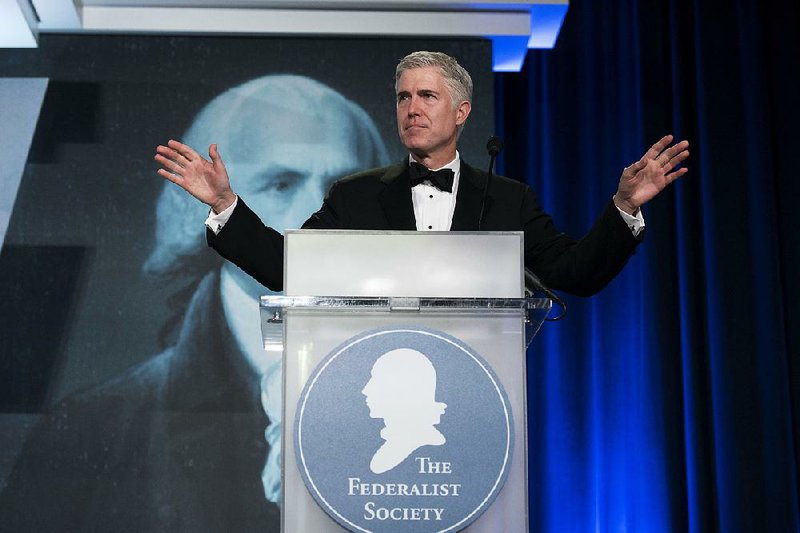WASHINGTON -- Justice Neil Gorsuch has been almost exactly what conservatives hoped for and liberals dreaded when he joined the court in April. He has consistently, even aggressively, lined up with the court's most conservative justices. He has even split with Chief Justice John Roberts, viewed by some as insufficiently conservative because of his two opinions upholding President Barack Obama's health law.
During arguments, Gorsuch has asked repeatedly about the original understanding of parts of the Constitution and laws, and he has raised questions about some long-standing court precedents, including the civil rights landmark ruling on "one person, one vote."
Liberals' despair about Gorsuch goes beyond his judicial actions. He occupies a seat once held by Justice Antonin Scalia which they thought Obama would get to fill. But Senate Republicans refused to consider Obama's nominee, a strategy that paid off when Donald Trump won the White House.
At the recent Federalist Society dinner, Gorsuch recognized the improbable turn of events that led him from an appellate judgeship in his native Colorado to America's highest court.
If someone had told Gorsuch a year ago what would soon transpire, "I would have said that you had taken way too much advantage of my home state's generous drug laws," he said.
Early reviews of Gorsuch's time on the court have varied with the ideological bent of his reviewers.
While his confirmation was pending, the liberal Alliance for Justice worried that Gorsuch would often embrace the most conservative outcome on the high court.
"Our concerns were confirmed," said Nan Aron, the group's president.
Daniel Epps, a Washington University law professor in St. Louis and onetime law clerk to Justice Anthony Kennedy, said he finds Gorsuch's style sometimes grating, less so the substance of his questions at arguments.
During a high-profile argument about politics in redistricting in October, Gorsuch began a question by suggesting that "maybe we can just for a second talk about the arcane matter, the Constitution."
To Epps, the tone was all wrong, especially for the new guy on the nine-member court. "I'd love to see a bit more recognition that the court deals with really hard questions that many people, including his colleagues, have struggled with for a long time. If someone thinks he has all the answers, maybe he's missing something important," Epps said.
Some of Gorsuch's choices of where to speak -- with Senate Majority Leader Mitch McConnell, R-Ky., at the Trump International Hotel and at the Federalist Society dinner -- also have fed perceptions that rubbed his critics the wrong way.
The dinner, Aron said, "was just the latest stop on Neil Gorsuch's thank you tour to honor the people who got him what should have been Merrick Garland's job." Garland, an appeals court judge, was the Obama nominee whom the Senate blocked.
"I think he could have done a better job certainly in the public appearances he chooses to make to sort of send the signal that he's not a Republican justice, he's a justice," said Epps, who also co-hosts the Supreme Court-focused First Mondays podcast.
His co-host, Ian Samuel, said there has been "a hysterical overreaction" to Gorsuch's questions in the courtroom. Samuel, a professor at Harvard Law School and former Scalia law clerk, said Gorsuch has an obvious interest in questions about accountability in the American system of government and control over the court system. "It's better that he puts it out there and says this is who I am. I don't think he cares whether some people think it's shocking," Samuel said.
Leonard Leo, the Federalist Society executive vice president who has advised Trump on judicial picks, also took issue with Gorsuch's critics when he introduced the justice at the dinner. "They mischaracterize candor and a demand for rigorous analysis as polarizing," Leo said.
Gorsuch and Leo embraced on the podium, in front of an adoring crowd of like-minded lawyers, judges and academics. The Federalist Society, which counted Scalia among its earliest backers, has helped Trump identify candidates for federal judgeships and has members in legal jobs across his administration.
Gorsuch made no apologies either for the substance of his questions and writing, or his style. He talked at length about the importance of seeking out the meaning of the Constitution and laws as they were understood when they were written.
"Originalism has regained its place at the table of constitutional interpretation, and textualism in the reading of statutes has triumphed. And neither one is going anywhere on my watch," Gorsuch said.
He went on to note that "some pundits have expressed bewilderment" about the questions he asks in court.
"But while I have you here tonight, I thought I might just settle the matter once and for all by taking a poll. ... Should I just keep on asking about the text and original meaning of the Constitution?" he asked.
The response was predictably and overwhelmingly in favor.
A Section on 11/26/2017

